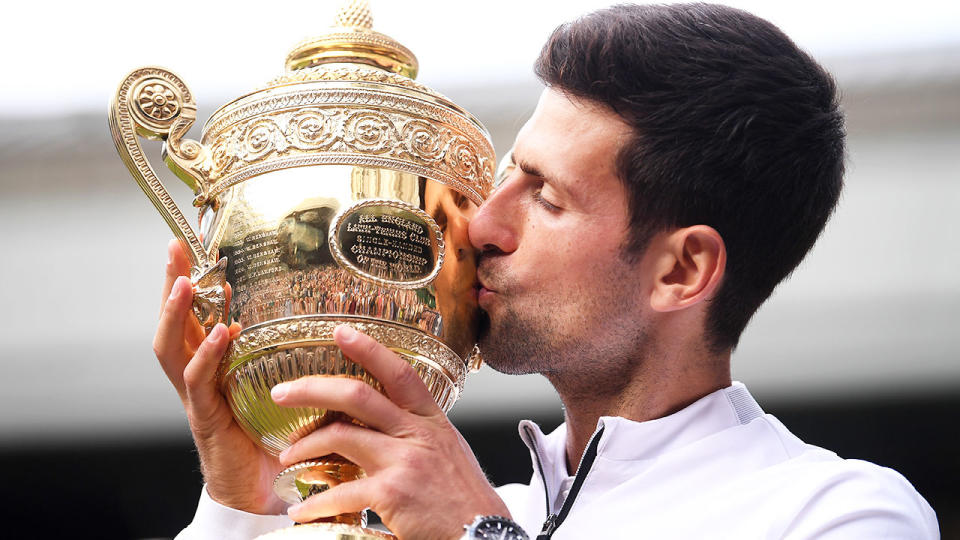The $226 million masterstroke behind Wimbledon's shock cancellation

An extraordinary sense of foresight looks to have benefited Wimbledon to the tune of more than $200 million, following the cancellation of the 2020 event due to the COVID-19 pandemic.
The tennis world was shocked and saddened when officials announced last week that Wimbledon was officially scrapped for 2020 due to the global crisis.
FAN FRENZY: Roger Federer sparks online craze in brilliant social media post
NOT HAPPY: Serena's coach exposes 'revolting' state of tennis
‘DOING DELIVERIES’: Kyrgios follows through with epic virus gesture
Rather than lose somewhere in the vicinity of half a billion dollars due to the cancellation of the 2020 tournament, Wimbledon looks set to recoup a massive chunk of those losses.
American sports reporter Darren Rovell says the All England Club was insured in case of a pandemic, and will receiive around $141 million ($A226 million) due to his year’s cancellation.
The venue had paid $2 million a year ($A3.2m) over the last 17 years in pandemic insurance, meaning it will reportedly reap the benefits now, thanks to that policy.
Wimbledon reportedly paid $2 million a year for pandemic insurance for the last 17 years
(Total: $34 Million)
For this year's cancellation as a result of the Coronavirus, Wimbledon will reportedly receive $141 million from the policy.— Darren Rovell (@darrenrovell) April 8, 2020
It could explain why organisers decided to cancel the 2020 event, rather than postponing it.
By cancelling, the event could collect the insurance money. Had Wimbledon only postponed the 2020 tournament, it would not have been eligible to collect that money.
While that’s a massive amount of money, it represents a loss for Wimbledon. Had the event proceeded as normal, Wimbledon was expected to make around £250 million — about A$496,000 million — in revenue.
The All England Club last week explained the reasons why Wimbledon was cancelled for the first time since World War II and not postponed, as was the case with the French Open.
They’ve spent a significant amount of time considering the impact the UK’s public health restrictions will have on preparations, which began in April and would’ve continued right up through the June 29 start date.
In the end, due to the risk for personnel and the lack of available supplies, they decided that cancellation was the only option.
“These considerations are particularly related to the concerns brought about by mass gatherings and the strain on the medical and emergency services, as well as movement and travel restrictions both within the UK and around the world," the Wimbledon statement read.
"With the likelihood that the Government’s measures will continue for many months, it is our view that we must act responsibly to protect the large numbers of people required to prepare The Championships from being at risk – from the training of ball boys and girls to thousands of officials, line judges, stewards, players, suppliers, media and contractors who convene on the AELTC Grounds – and equally to consider that the people, supplies and services legally required to stage The Championships would not be available at any point this summer, thus ruling out postponement."
Tennis season could be pushed back to later finish date
The men's and women's professional tennis tours are examining contingency plans for post-coronavirus rescheduling, including the possibility of pushing back the end of the 2020 season.
The heads of the WTA and ATP said on Monday their groups are working together on ways to assemble a new calendar.
Under consideration are moving postponed tournaments into weeks that already have events and making the season longer than it already is by playing past the tours' originally slated November finishes.
All of pro tennis is suspended at least until July 13 because of the COVID-19 outbreak.
That is the day after Wimbledon was supposed to end; the All England Club announced last week it was cancelling the oldest grand slam tournament for the first time since it was shelved from 1940-45 during World War II.
The tours have been periodically telling tournaments, players and the public how long the suspension will last. Another update is expected by the middle of May.
ATP Chairman Andrea Gaudenzi said the men's tour ideally would like to finish the season on time in November if competition can resume in July.
"Nothing is ruled out at this stage," he said.
Tennis finds itself in a somewhat unique position because of the international travel required of athletes from week to week, the players' status as independent contractors and the lack of one overarching governing body.
While superstars such as Serena Williams, Roger Federer, Rafael Nadal and Novak Djokovic have earned millions upon millions over the years - more from sponsorships than prize money - lower-ranked players depend on playing regularly in tournaments for their income.
The combined ATP-WTA Madrid Open, which was to be played May 1-10, announced on Monday it will have a video game version of the tournament on April 27-30, with players swinging controllers instead of rackets.
About $325,000 in prize money will go to the winners, who then can decide what portion of that will be donated to tennis players who need financial help.
Another $55,000 will be used to reduce the social impact of the pandemic.
Last year's Madrid Open paid out more than $14 million.
with agencies
